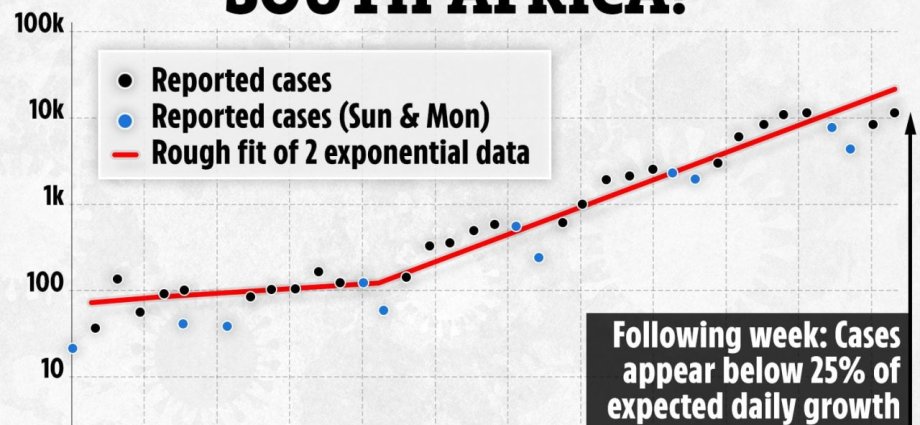OMICRON cases in the province in South Africa where the variant is first thought to have emerged may have peaked, data shows.
The figures could be ‘good news’ for Brits, after Prime Minister Boris Johnson was last night forced to implement Plan B to stop the variant spreading.

Plan B means that people have been asked to work from home if they can and that vaccines passports have been introduced at certain venues.
Data shows that cases in the Gauteng province in South Africa have increased by around 25 per cent a day since November.
In the UK experts have said that infections from Omicron are doubling every two to three days and it was this evening reported that cases have risen by 44 per cent in 24 hours.
The UK Health Security Agency (UKHSA) said another 249 cases of the variant had been detected, taking the total to 817.
However, the UKHSA has said the number of infections is likely to be more in the region of 10,000.
Mathematician at University College London, Professor Christina Pagel, posted a chart to Twitter – which showed that cases could be flattening.
She said: “There is some tentative good news out of Gauteng this week, suggesting that cases might be reaching a peak there.”
The chart shows that at the beginning of November, there had been a gradual increase in Omicron cases in Gauteng.
Then as the month goes on, there is a steep increase in cases, bleeding into the beginning of December.
 Read our Omicron variant live blog for the latest news
Read our Omicron variant live blog for the latest news
A peak them seems to be reached at around 10,000 cases a day before they start to fall off around December 6.
Prof Pagel says that this is ‘well below’ where you would expect for a 25 per cent a day rise.
However, on the same thread, she also highlights a separate graph which suggests that the drop in Covid cases could actually be down to testing.
Dr Ridhwaan Suliman added: “Test positivity in Gauteng jumped to 35% for week ending 4 Dec, up from 16.3% in previous week.
“No doubt there are many more undetected case.”
While cases in South Africa could be evening out, experts in the UK have warned that Brits are likely to see a ‘large wave’ of Omicron.
Professor John Edmunds, a member of the Scientific Advisory Group for Emergencies (Sage), told a Royal Society of Medicine briefing that “we’re certainly not out of the woods”.
He said that sequencing of tests suggests that Omicron has actually been around since mid-October.
VIRAL EVOLUTION
He added: “I think over the next two months, we’re going to see a really rather large wave of Omicron, we’re getting large numbers of cases and that will result in a large number of hospitalisations and, unfortunately, it will result in a large number of deaths, I’m pretty sure of that.”
“What happens next? It’s pretty clear the virus hasn’t done with evolution. It’s going to continue to evolve.
“I’ve long thought that what we’ll start to see is that the virus evolves towards being more of an immune escape than necessarily more transmissible.”
Health Secretary Sajid Javid said with the fast doubling rate of variant cases, UK infections could hit one million by the new year if restrictions had no effect on the rate Omicron is spreading.
It raises concerns of starting the year with a fresh lockdown despite the rollout of booster vaccines.
UKHSA Chief Medical Advisor, Dr Susan Hopkins said “vaccination is critical to help us bolster our defences against becoming severely ill from this new variant”.
Adults are urged to accept their booster vaccine invite as soon as it arrives from the NHS, while there are still millions yet to take up their initial course of jabs.
Today 50,867 new Covid cases were reported in the UK, and 148 deaths from the virus, of which Delta is still the dominant strain.












